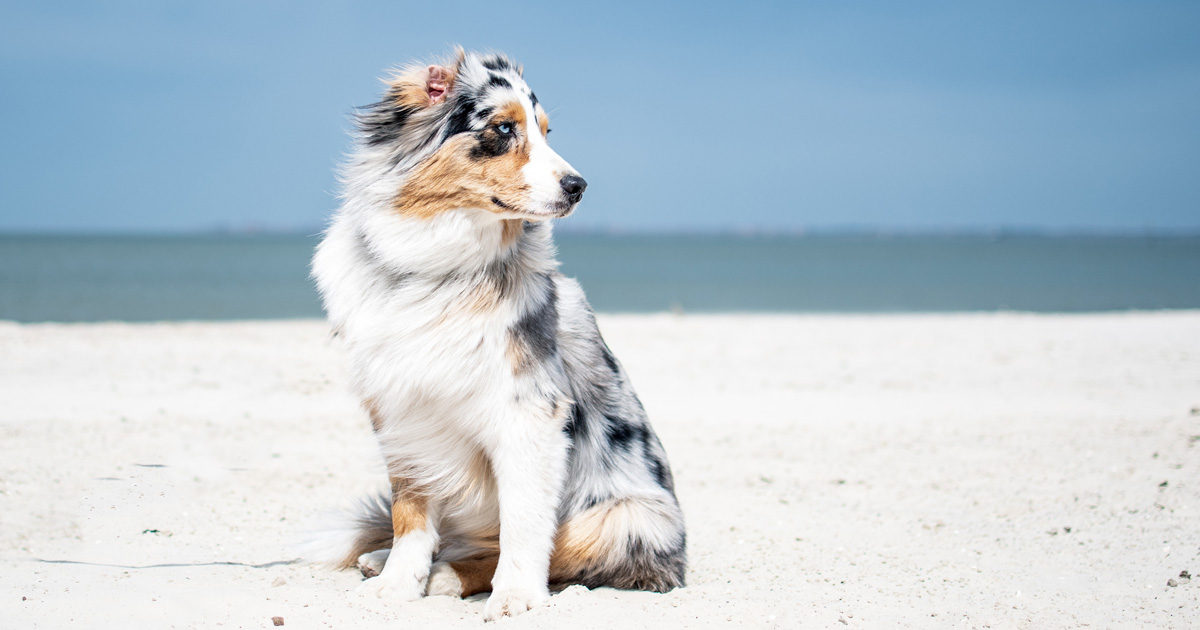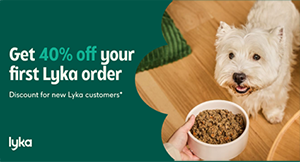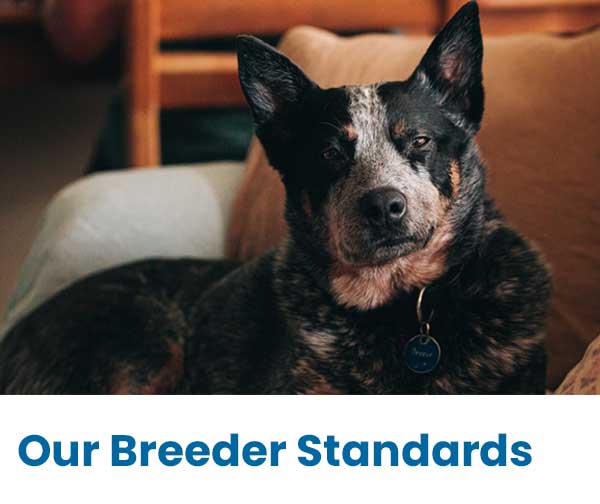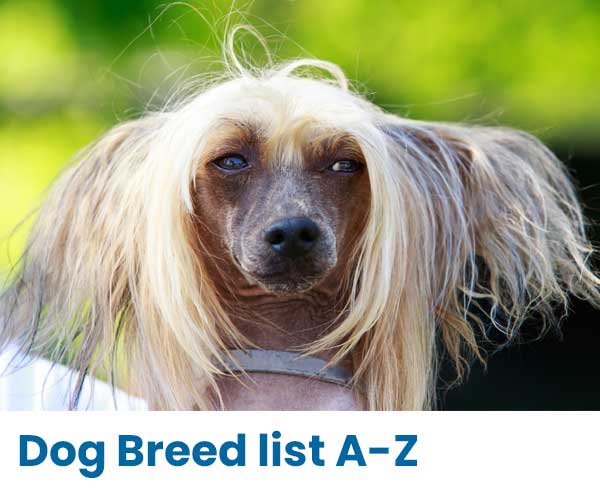Australian Shepherd breed guide
With a gorgeous coat and a steady, friendly temperament, the Australian Shepherd can be a lovely family pet for active households. Bred for work, they are highly valued by stockmen for their versatility, intelligence, and high trainability. They are also excellent search and rescue dogs, disaster and detection dogs, guide, service, and therapy dogs. They are high energy so if not working will need long daily walks, off lead running, and lots of games to keep them physically and mentally healthy and happy. While Aussies are dependable and devoted to family, they can be reserved with strangers. They are good guard dogs and will bark, but should not bite.
Aussies can suffer if they are not kept occupied and chronic boredom can lead to issues. They will bark, dig holes, destroy gardens and chew anything left in reach.
Australian Shepherds are a medium-sized dog, solid and muscular, with a full or naturally bobbed tail, and varied coat colouration. Each dog’s coat and eye colour are individual. To the untrained eye the Aussie resembles a Border Collie, but is slightly larger and has a wider range of coat colours - Black, Blue Merle, Red, Red Merle, all with or without copper and/or white. Eye color combinations can be brown, hazel, blue and amber.
Heritage: Herding
Australian Shepherd Temperament
The Australian Shepherd is an intelligent, affectionate and very active dog with strong herding and guarding instincts and an even disposition. The breed is attentive, animated, and good-natured.
The ideal owner for an Australian Shepherd
While an Aussie can be a great addition to the family, they are not the breed for everyone. Their high energy is best suited to those that are very active with an outdoors lifestyle. They will suit most households, getting along well with children and the elderly. Families with children should be aware that herding instincts (chasing, nipping, circling) can result in a tendency to 'herd'' the children.
Training & socialisation for Australian Shepherds
Obedience training is important for Australian Shepherds. This will help you develop a strong relationship with your dog, and ensure the socialisation it needs.
Australian Shepherds & children
It is important to teach children to respect your dog, and your dog to respect your children. Generally speaking, dogs tend to see children as siblings, and the dog should never be allowed a higher position than the child. Parents, not children, should be responsible for teaching the puppy and correcting the dog if it gets too rough.
How much space & exercise do Australian Shepherds need?
Australian Shepherds are full-of-beans, high-energy dogs and need outdoor space to run. Daily walks or runs are a must, and they will enjoy games of fetch or frisbee. If you don't keep your Aussie exercised and occupied destructive behaviour can develop so you must be committed to giving the time and attention necessary to expend it's mental and physical energy. Teaching your Aussie tricks helps to keep them focussed and entertained, while also keeping their minds working. Australian shepherds have great stamina and move well in all types of terrain which makes them great trail dogs.
Australian Shepherds & grooming
General facts about Australian Shepherds
Average life expectancy: 12-14 years
Aussies live a long time. This is a huge commitment that will last 10 to 15 years or more. Think it through. If they are the breed for you, you will be rewarded with a loyal companion.
Height & Weight
It is important to watch the weight of an Aussie as they can become overweight quickly.
Potential health issues in Australian Shepherds
In general the Australian Shepherd is a hardy breed, but they do have some diseases that can be inherited. Responsible breeders will use all available tests before breeding. At a minimum parents must be tested for hip Dysplasia and both parents and pups should have clear eye certificates.
Hip and Elbow Scoring
Canine hip dysplasia (HD) is the most common heritable orthopaedic problem seen in dogs. It affects virtually all breeds, but is particularly problematic in large and giant breeds. HD develops into a degenerative condition (osteoarthritis) of the hip joints. With Australian Shepherds it is a requirement that breeding pairs are radiographically assessed for the presence of degenerative changes and/or subluxation of the hip.
If making enquiries about an Australian Shepherd dog or pup, ask for proof that testing of both parents included an official hipscore (not just a vet check) and current eye clearance by a registered opthamologist. Preferably also an official score for elbows. It is also good to have tests for the MDR1 drug sensitivity mutation. The Australian Shepherd Health & Genetics Institute Inc reports 32% of Aussies had at least one copy of the gene, being either carriers or affected. Testing for Collie Eye Anomoly and HSF4 cataract DNA are also recommended.
See The Australian Shepherd Health and Genetics (ASHGI) website for more information and articles by Dr Leos Kral and CA Sharp, a recognised expert in Australian Shepherd genetics.
Australian Shepherd FAQ's
Can Australian Shepherds be left alone?
Aussies thrive on company and being with their families. They don't do well if they are alone for too long or too often without companionship. Leaving them alone can cause an undue amount of stress, and they can become destructive if left alone and confined for too long. Australian Shepherds can also suffer from separation anxiety which can present as excessive barking, panting or salivating.
How do I exercise my Australian Shepherd?
Australian Shepherds need owners that are committed to giving them lots of exercise as they need to move and run regularly to stay happy and healthy. If they not being used as a working dog, Aussies require a minimum of 30-60 minutes of exercise a day. Even up to 2 hours per day is often recommended for this particularly energetic breed. High intensity activities like running, mountain walking, hiking, skiing and biking are great. Playing frisbee and fetch are also favourites. Daily obedience training or competing in herding and agility trials are recommended for Aussies where they excel.
If you are a small scale ANKC registered breeder and would like to be listed here, just contact us or follow a few simple steps to add your details yourself.
We welcome helpful comments and contributions to information about this breed by email







